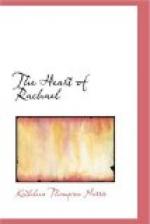She would have broken Stephen’s heart; but Stephen was dead. She had seized upon Clarence with never a thought of what she was to give him, with never a prayer as to her fitness to be his wife, nor his fitness to be the father of her children. She had laughed at self-sacrifice, laughed at endurance, laughed at married love— these things were only words to her. And when she had tugged with all her might at the problem before her, and tried, with her pitiable, untrained strength to force what she wished from Fate, then she had flung the whole thing aside, and rushed on to new experiments—and to new failures.
Always on the surface, always thinking of the impression she made on the watching men and women about her, what a life it had been! She had never known who made Clarence’s money, what his own father had been like, what the forces were that had formed him, and had made him what he was. He did not please her, that began and ended the story. He had presently flung himself into eternity with as little heed as she had cast herself into her new life.
Ah, but there had been a difference there! She had loved there, and been awakened by great love. Her child’s crumpled, rosy foot had come to mean more to her than all the world had meant before. The smile, or the frown, in her husband’s eyes had been her sunshine or her storm. Through love she had come to know the brimming life of the world, the pathos, the comedy that is ready to spill itself over every humble window-sill, the joy that some woman’s heart feels whenever the piping cry of the new-born sounds in a darkened room, the sorrow held by every shabby white hearse that winds its way through a hot and unnoticing street. She had clung to husband and sons with the tigerish tenacity that is the rightful dower of wife and mother; she had thought the world well lost in holding them.
And then the sordid, selfish past rose like an ugly mist before her, and she found at her lips the bitter cup she had filled herself. She was not so safe now, behind her barrier of love, but that the terrible machinery she had set in motion might bring its grinding wheels to bear upon the lives she guarded. She had flung her solemn promise aside, once; what defence could she make for a second solemn promise now? The world, divorce mad, spun blindly on, and the echo of her own complacent “one in twelve” came faintly, sickly back to her after the happy years.
“Divorce has actually no place in our laws, it isn’t either wrong or right,” Rachael said one autumn day when they were walking slowly to the beach. Over their heads the trees were turning scarlet; the days were still soft and warm, but twilight fell earlier now, and in the air at morning and evening was the intoxicating sharpness, the thin blue and clear steel color that mark the dying summer. Alice’s three younger children were in school, and the family came to Clark’s Hills only for the week-ends, but Rachael and her boys stayed on and on, enjoying the rare warmth and beauty of the Indian Summer, and comfortable in the old house that had weathered fifty autumns and would weather fifty more.




